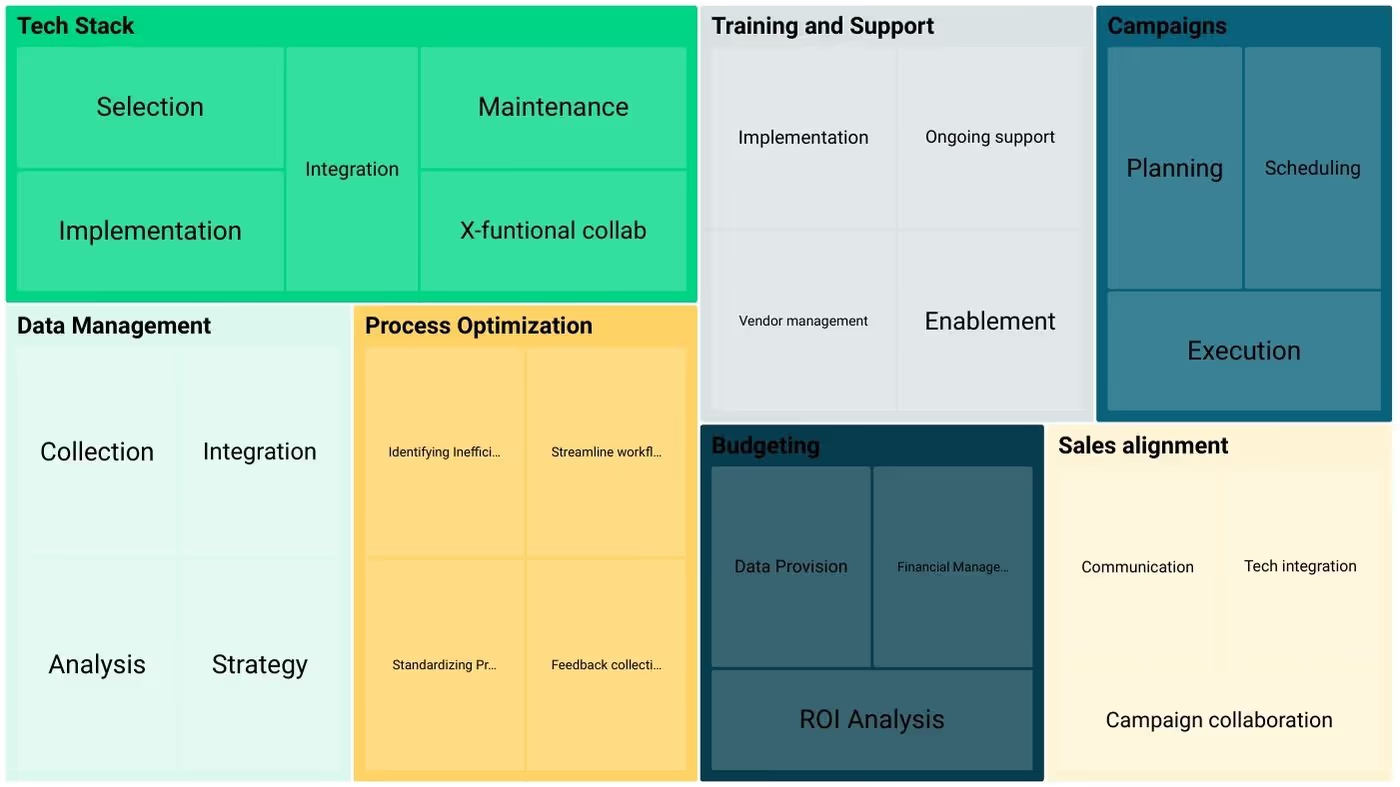Ready to create more pipeline?
Get a demo and discover why thousands of SDR and Sales teams trust LeadIQ to help them build pipeline confidently.



Marketing operations streamlines all behind-the-scenes activities of marketing, ensuring efficient planning, execution, and analysis of marketing efforts.

Key responsibilities of marketing operations teams include evaluating marketing performance, strategic planning, budgeting, optimizing marketing processes, and managing marketing technologies and data.

Effective marketing operations teams should design measurable campaigns, establish smart budgets, and use efficient strategies for lead tracking by working closely with the sales team.
Get a demo and discover why thousands of SDR and Sales teams trust LeadIQ to help them build pipeline confidently.
You might be able to create the best marketing messaging and collateral in the world. But if your target audience never sees it, what good does it do?
Enter marketing operations, which aims to streamline and optimize marketing activities, increasing the chances your team is able to engage your target audience and attract the attention of organizations that match your ideal customer profile (ICP).
For the last decade, I’ve been fully immersed in the world of marketing ops, donning several different hats for companies big and small in both full-time and contract positions. Based on these experiences, I can tell you with confidence that — even if your company doesn’t have a dedicated marketing ops team — the responsibilities are falling onto someone’s shoulders. Maybe it’s sales, maybe it’s RevOps, or maybe it’s various members of the marketing team.
Whether you have a bona fide marketing ops function at your company or not, you need to make sure there’s at least someone taking care of marketing operations tasks. Otherwise, it’s impossible to get the biggest bang for your buck with every dollar you invest in marketing.
Keep reading to learn more about marketing ops, including marketing operations roles and responsibilities, goals, functions, and best practices.
Marketing operations refers to the strategic planning, execution, and management of all marketing activities within an organization. By coordinating various aspects of marketing — like budgeting, campaign management, data analysis, tech stacks, and performance measurement — marketing ops ensures efforts are aligned with business objectives and that resources are used in an optimal fashion.
At a high level, marketing operations aims to streamline processes, improve efficiency, and drive better results across the marketing function using data, metrics, and best practices. Ultimately, marketing ops enables core marketing functions to deliver more value and hit their goals.

To help the marketing department achieve their full potential, marketing ops is tasked with several mission-critical responsibilities.
Ops teams are tasked with selecting, implementing, integrating, and managing the technology and tools the marketing department uses. Some of these tools include customer relationship management (CRM) systems, marketing automation platforms, marketing intelligence platforms, content management systems, and analytics tools, among others.
Since ops is laser-focused on helping the marketing team smash their goals, it’s critical to build a tightly integrated tech stack. By doing so, they can help their colleagues reduce tool hopping, which eats up 9% of the average worker’s time each year, while minimizing context switching and speeding up workflows.
In an age where marketing teams are increasingly joining forces with sales and RevOps to move swiftly toward organizational goals, it’s important to think about all of these business units while creating a tech stack. For the best results, marketing ops teams should aim to build a sales and prospecting hub that brings every critical tool together under one roof.
Ops teams are tasked with collecting various types of data from multiple sources — like CRM tools, social media platforms, ad platforms, email marketing tools, and website data. After gathering all of this data, ops teams are responsible for integrating all of it to ensure data quality and maintain a clean, trustworthy source of truth for the organization.
Once the data is cleaned up, ops teams spend time analyzing it to identify KPIs and metrics relevant to achieving team goals. Through data analysis, ops can uncover patterns, trends, and insights, and they can also better understand customer segments and their behaviors. Using this information, they also enable the rest of marketing to make their own data-driven decisions for campaigns.
Committed to continuous improvement, ops teams suggest new strategies and campaigns based on their findings. This includes A/B tests and making data-driven decisions to enhance campaign performance.
Ops teams collaborate with marketing managers and other stakeholders to develop comprehensive campaign plans. This process includes defining campaign goals, identifying the target audience, and optimizing messaging and positioning. At the same time, ops is tasked with conducting market research and defining KPIs to measure campaign success.
Once the campaign blueprint is ironed out, ops takes charge of scheduling to ensure that all activities are completed on time. This includes developing timelines for each campaign phase, from ideation to execution, coordinating with cross-functional teams to align on deadlines and deliverables, and monitoring progress to ensure nothing is blocked.
As part of the campaign management and execution responsibilities, ops is also responsible for providing data that marketing and GTM leaders use to determine budgets and resource allocation. At the same time, ops teams need to carefully manage finances to ensure that campaigns fall within budget. By closely monitoring spending patterns and comparing them against budget projections, ops can identify overspending early on and adjust their plans accordingly.
Ultimately, ops helps the team ensure that marketing initiatives deliver proper return on investment (ROI). By analyzing marketing operations KPIs — metrics like customer acquisition costs, conversion rates, and pipeline generated — ops can assess the impact of each campaign on business goals. Armed with this information, they can then suggest ways to optimize resource allocation, redirecting funds to the highest performing channels and campaigns.
By identifying inefficiencies, streamlining workflows, and standardizing procedures within the marketing function, marketing operations teams drive process optimization. Ops teams seek to surface and remove bottlenecks and pain points in existing workflows by thoroughly reviewing processes and collecting feedback from team members about what’s working and what isn’t. Using that information, ops eliminates redundancy and introduces automation where it makes sense to increase efficiency.
This is exactly where a tightly integrated, purpose-built tech stack can make a major impact.
By facilitating communication, collaboration, and the integration of processes and strategies, ops ensures marketing is aligned with sales and other departments. At a high level, ops serves as a liaison between marketing and sales teams, ensuring that everyone is on the same page when it comes to goals, priorities and messaging.
At the same time, ops works to integrate marketing and sales processes, systems, and technologies to streamline operations and improve efficiency. By aligning CRM systems, marketing automation platforms, and other tools to create a purpose-built prospecting hub, ops enables seamless data sharing and workflow integration between sales and marketing, which leads to smoother lead management and better conversion rates.
In addition to sales, ops collaborate with other departments — finance, product, and customer success — to ensure that marketing initiatives are aligned with broader organizational objectives.
To achieve their goals, ops provides training and support to help their peers learn how to use the tools and technologies they deploy. Not only do they facilitate initial training sessions with teammates, they also provide ongoing support and guidance to ensure that colleagues are using the tech stack to the fullest potential. This support includes answering questions, troubleshooting issues, and sharing best practices to help each team member optimize their own workflows.
On top of this, ops interfaces with external vendors and service providers to make sure new tools are deployed and integrated smoothly. They also stay informed about product updates and new features to keep the marketing function on the cutting edge.
By managing all of these responsibilities, ops teams hope to achieve the following goals.
Marketing ops’ primary goal is improving ROI. By analyzing campaign performance metrics and optimizing resource allocation, ops ensures that marketing investments yield the highest possible return, ultimately driving more revenue by converting more prospects into customers.
Ops teams aim to enhance the impact of marketing campaigns by leveraging data-driven insights to refine targeting, messaging, and channel selection, thereby maximizing engagement, conversions, and overall campaign success.
Marketing ops works to maintain and enhance the accuracy, completeness, and consistency of marketing data. By doing so, they can make more informed decisions with confidence while segmenting their audience more granularly and personalizing cold outreach.
To free up time so teammates can focus on higher-value activities, marketing ops looks to streamline as many repetitive tasks and workflows as they can, using automation to increase productivity and reduce manual errors.
Marketing operations teams collaborate with sales and marketing to define and refine criteria for marketing qualified leads (MQLs) and — for those organizations following an account-based marketing (ABM) methodology — marketing qualified accounts (MQAs), implementing strategies to attract and nurture leads/accounts effectively. This, in turn, translates into a higher volume of qualified leads/accounts that are more likely to convert.
Additionally, ops teams ensure that marketing strategies and tactics are closely aligned with broader business goals and objectives. By encouraging cohesion between marketing efforts and organizational priorities, ops helps drive overall growth and success.
Not every organization has a fully baked marketing ops team, but here are the roles that you typically find within mature ops functions:
To achieve their goals, top-performing marketing operations teams follow these best practices.
Some of the ops function’s most important priorities include designing and implementing processes, providing an integrated tech stack, and analyzing data so that the marketing team can unleash its full potential for the organization.
In many cases, marketers attempt to build successful campaigns but forget to enable them with the instruments needed to measure success. To avoid this fate, marketing ops should bake measurement processes directly into their campaigns. At the same time, they should train the marketing team on the best way to take accurate measurements.
This can be accomplished by creating campaigns with specific, quantifiable goals in mind, and then teaching marketers to demonstrate how they will achieve those goals.
According to HubSpot data, B2B tech companies spend roughly 12% of their annual revenue on marketing. With so much money being poured into marketing, it's important for ops to help the team establish a budget by providing data that marketing and GTM leaders use to determine how to allocate resources.
Before launching a campaign, marketers should consider how to allot financial resources across the following areas:
Looking at marketing data helps ops determine how much to allocate to each category. Teams might decide to make budgeting decisions based upon how important each channel is for the business or they might plan campaigns that need bigger budgets at specific times of the year.
Whatever the case may be, this is why strategic budget planning is important. By planning the year out, ops can allocate money where it’s most beneficial. This will allow you to prioritize spending on strategies that deliver the highest return on investment (ROI).
Far too often, lead qualification gets overlooked — which is why it’s so important to understand the differences between lead scoring and lead tracking:
If your goal is driving sales, it’s important to have a system in place that organizes lead tracking (and account tracking, too). Marketing ops should keep your database clean and tidy while helping set goals for KPIs and other expectations.
At the same time, marketing ops needs to leverage intent data, working with sales development and enablement teams to define scoring, route leads/accounts appropriately, and ensure sellers understand and can act upon the data they’re receiving.
To take your efforts to the next level, follow these best practices from Marketo:
In today’s digital age, building a tightly integrated tech stack designed for sales and marketing efficiency is perhaps the north star for marketing ops.
With a centralized prospecting hub in place, data flows seamlessly between sales and marketing systems, giving teams a holistic view of customer interactions and behaviors across the buyer’s journey. This enhances the lead management process, improving lead scoring accuracy while enabling more targeted and personalized outreach.
Additionally, an integrated stack streamlines workflows and eliminates manual data entry, reducing errors and giving employees more time to focus on what’s most important. With a complete picture of customer and prospect interactions, marketing and sales teams gain valuable insights into campaign performance and engagement, making it that much easier to fine-tune their strategies and drive more revenue.
For the best results, ops should ensure the tools they pick are feature-rich, intuitive by design, and easy to implement. After all, the last thing you want is to deploy new tools only to find out the hard way they’re lacking in features, difficult to navigate, or take forever to roll out.
At the end of the day, marketing ops makes it possible for teams to effectively complete day-to-day marketing and sales activities.
By aligning processes, analyzing data, and helping set goals, marketing operations is as responsible for holding the marketing department together as nails are for ensuring a house stays upright.
When you’re ready to begin putting together tools that help your marketing, sales, and RevOps teams soar to new heights, book a demo of LeadIQ and see how snugly it fits inside your sales and marketing tech stack.